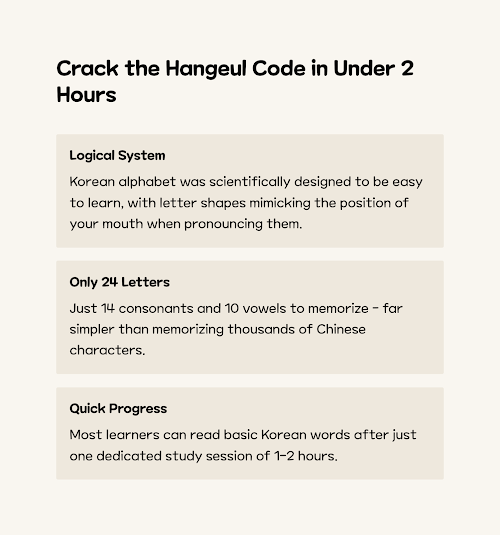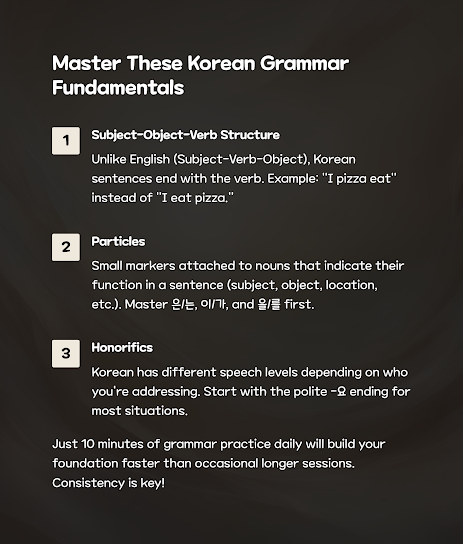The Ultimate Guide to Starting Korean as a Complete Beginner
Learn Hangeul, build vocabulary, and master grammar the right way
Starting a new language can feel overwhelming—especially when the writing system, grammar structure, and pronunciation are completely different from your native tongue. But don't worry. With the right guidance and consistent effort, learning Korean can be a deeply rewarding experience. This blog is designed to provide step-by-step guidance for absolute beginners. Whether you’re learning for travel, K-dramas, work, or study, we’ll walk through the essential phases of mastering Korean. From learning the Korean alphabet Hangeul, to building vocabulary, and forming your first sentences— this roadmap will give you the clarity and confidence to begin your journey. Let’s make learning Korean simple, structured, and successful.
| Hangeul | Learn the Korean alphabet in just 90 minutes |
| Core Vocabulary | Build your first 100–200 words with daily practice |
The first step to learning Korean is mastering the alphabet—Hangeul. Unlike complex writing systems like Chinese or Japanese, Hangeul was specifically designed for simplicity and logic. It consists of 14 consonants and 10 vowels, and most learners can understand its structure within 90 minutes. Being able to read Korean text not only boosts your confidence early on but also sets a strong foundation for pronunciation, grammar, and vocabulary. Don't rely on romanization—start with Hangeul and you’ll pronounce Korean words far more accurately.
Once you’ve learned the alphabet, your next priority should be building vocabulary and understanding basic grammar structures. Learn everyday expressions like greetings, numbers, days of the week, and essential verbs. Use apps like Duolingo and Memrise, or listen to audio lessons from KoreanClass101. Start constructing simple sentences using the SOV (Subject-Object-Verb) structure and practice polite endings such as -요 or -이에요. It’s also important to familiarize yourself with particles like 은/는 and 을/를 early on.
Consistency is essential when learning any language, and Korean is no exception. Spend 15–30 minutes each day reviewing vocabulary, listening to real Korean conversations, and practicing speaking out loud. Watching K-dramas with subtitles and singing along to K-pop can help reinforce pronunciation and intonation naturally. Also, track your progress using learning apps, and consider joining online language exchange platforms like HelloTalk to converse with native speakers. The key is daily exposure and small wins.
| Learn Hangeul | Build Vocabulary | Basic Grammar |
| Master the Korean alphabet using visual guides and repetition | Learn 100–200 common Korean words in the first month | Focus on particles and the Subject-Object-Verb sentence order |
| Use TTMIK or 90 Day Korean to learn in under 2 hours | Practice daily using apps like Memrise and Duolingo | Practice forming polite sentences using basic verbs and endings |
Starting your Korean language journey as a complete beginner can feel daunting, but the rewards are incredibly fulfilling. From mastering Hangeul in under 2 hours to forming full sentences and speaking confidently, every step forward adds value. The key is to be patient and consistent. Use technology to your advantage, integrate fun activities like watching K-dramas, and stay engaged by connecting with the Korean language and culture in daily life. Your fluency goal may take time, but every small effort compounds into real progress. Keep your goals clear, track your improvements, and celebrate the milestones. You're not just learning a language—you're opening the door to a whole new world.
Share your thoughts with us!
Have you started learning Korean? What’s been the biggest challenge so far? Let us know in the comments below—we’d love to hear your tips, struggles, or your favorite learning tools. Let’s support each other on this language journey!
Tags:
Copy-ready Tags:







0 댓글